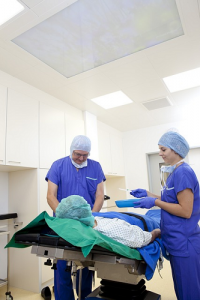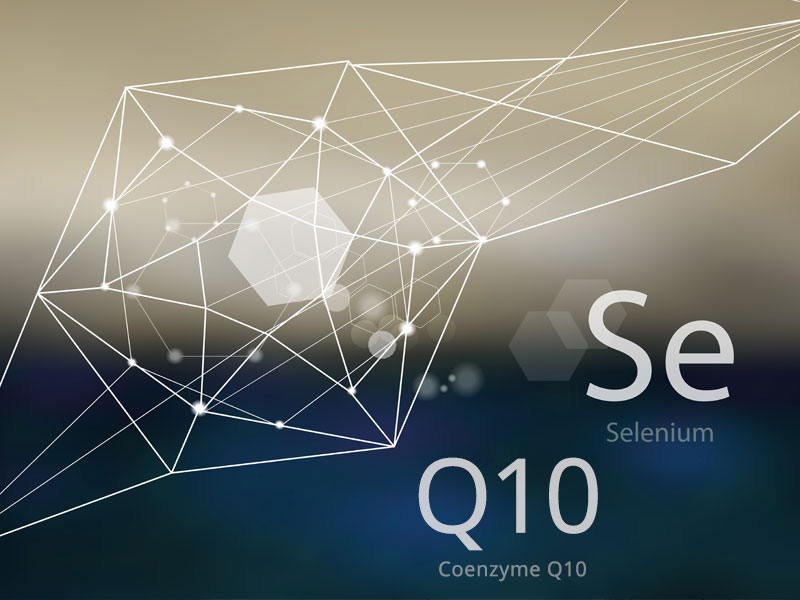
Swedish seniors, both men and women, who took Q10 and selenium supplements for a 4-year period spent 13% fewer days in the hospital and had significantly better quality of life than did Swedish seniors who took placebos.
There is a tantalizingly interesting relationship between the essential bio-nutrient Coenzyme Q10 and the trace element selenium and heart disease. One of the first clinical researchers to tease out the effects of supplementation with Q10 and selenium in heart attack patients was Dr. Bodo Kuklinski.
Coenzyme Q10 and selenium for heart attack patients
Dr. Kuklinski tested 61 patients who had been admitted to the hospital in Rostock, Germany, with an acute myocardial infarction and with symptoms of less than six hours’ duration. He assigned 32 of the patients to the adjuvant treatment group and 29 of the patients to the control group.
Adjuvant treatment with Coenzyme Q10 and selenium
The 32 patients in the adjuvant treatment group got 100 milligrams of a well-formulated Coenzyme Q10 preparation and 100 micrograms of an organic selenium yeast product for a period of one year. The 29 patients in the control group got the same conventional therapy but did not get Q10 or selenium supplements.
Better results in Dr. Kuklinski’s Q10/selenium group
Dr. Kuklinski reported that none of the 32 patients in the Q10/selenium group showed a prolongation of the frequency corrected QT-interval (the time between the start of the Q wave and the end of the T wave in the heart’s electrical cycle). But, 40% of the patients in the control group did show a prolongation of the QT-interval by more than 440 msec (p < 0.001).
Difference in one-year mortality rates with Q10 and selenium
Moreover, during the one-year follow-up period after the heart attack, six patients (20%) in the Dr. Kuklinski’s control group died from a second heart attack. In his Q10/selenium treatment group, only one patient (3%) died after one year, and that death was from a non-cardiac cause.
More pieces of the Q10/selenium supplementation puzzle
Xia and Nordman and teams of researchers at the renowned Karolinska Institut in Stockholm, Sweden, have found that the sustained antioxidant function of Coenzyme Q10 is dependent upon the presence of selenium and upon the action of three seleno-enzymes (5,6).
Moosmann and Behl at the Johannes Gutenberg University Medical School in Mainz, Germany, have found another interesting relationship between Coenzyme Q10 and selenium (4). They have found that Coenzyme Q10 plays an important role in the synthesis of the amino acid selenocysteine, which is, in turn, needed for the antioxidant function of Coenzyme Q10.
Adverse effects of statins on synthesis of Q10 and of selenoproteins
Furthermore, Moosmann and Behl suggest that statin medications inhibit not only the body’s synthesis of Coenzyme Q10 but also inhibit the synthesis of selenoproteins, which may explain many of the noted adverse effects of statin medications (3). Among these potential adverse effects of taking statin medications, which inhibit the synthesis of Coenzyme Q10 and selenoproteins, is the possible stimulation of atherosclerosis and heart failure.
Decrease in statin-associated myopathy with Q10
Fedacko et al did a pilot study with 60 patients that showed that daily supplementation with 100 mg of ubiquinone Q10 and 100 mcg of an organic selenium yeast for 12 months reduced the symptoms of statin-associated myopathy, both in the numbers of the symptoms and in the intensity of the symptoms. The ubiquinone Q10 supplementation resulted in less muscle pain and less muscle weakness and fatigue.
The researchers speculated that there may be a connection between a lack of selenium in the patients’ diet and the Q10 deficiency that the Q10 supplementation addresses (2).
Q10/selenium supplementation in the KiSel-10 study
Professor Urban Alehagen and a team of researchers from the University of Linköping in central Sweden have looked at the following factors:
- the inter-relationship of the antioxidant functions of Coenzyme Q10 and selenium
- the low intakes of Q10 and selenium in the diets of people living in Sweden and much of northern Europe
- the declining bio-synthesis of Q10 in people as they get older
Ubiquinone Q10 + selenium for 4 years
With these factors in mind, Professor Alehagen and his team decided to test the efficacy of supplementation of relatively healthy elderly Swedish citizens, as yet not institutionalized and still able to live at home, with ubiquinone Q10 and with selenium daily for four years. The researchers randomized 443 elderly Swedes – average age 77 years – to a placebo group and to a treatment group receiving 200 milligrams of a medicinal-quality ubiquinone Q10 supplement, taken as 100 mg twice daily, and 100 micrograms of a patented organic selenium yeast product, taken once daily.
Lasting effect of Q10 and selenium supplementation
The intervention with the Q10 and selenium lasted 4 years. The researchers followed the participants for an additional 10 years. At the end of the 4-year intervention period and during the 10-year follow-up period, there was and continued to be significantly lower risk of cardiovascular death in the Q10 and selenium treatment group. In other words, the protective effect of the Q10 and selenium supplementation persisted in elderly individuals during the 10-year period after the intervention was officially terminated (1).
Coenzyme Q10 and selenium: antioxidant partners
As we get older, we risk producing more harmful free radicals than our antioxidant defense systems can keep under control. The result of an imbalance between free radicals and antioxidants is called oxidative stress, and oxidative stress can and does lead to the development of degenerative disorders including heart disease.
The KiSel-10 study has shown that daily supplementation of the diet with Coenzyme Q10 and selenium can have the following heart health benefits:
- improve quality of life
- reduce the number and length of hospitalization
- decrease the risk of death from heart disease
Sources:
- Alehagen, U., Aaseth, J., & Johansson, P. (2015). Reduced Cardiovascular Mortality 10 Years after Supplementation with Selenium and Coenzyme Q10 for Four Years: Follow-Up Results of a Prospective Randomized Double-Blind Placebo-Controlled Trial in Elderly Citizens. Plos One, 10(12), e0141641.
- Fedacko, J., Pella, D., Fedackova, P., Hänninen, O., Tuomainen, P., Jarcuska, P., & … Littarru, G. P. (2013). Coenzyme Q(10) and selenium in statin-associated myopathy treatment. Canadian Journal Of Physiology And Pharmacology, 91(2), 165-170.
- Moosmann, B., & Behl, C. (2004). Selenoprotein synthesis and side-effects of statins. Lancet (London, England), 363(9412), 892-894.
- Moosmann, B., & Behl, C. (2004). Selenoproteins, cholesterol-lowering drugs, and the consequences: revisiting of the mevalonate pathway. Trends In Cardiovascular Medicine, 14(7), 273-281.
- Nordman, T., Xia, L., Björkhem-Bergman, L., Damdimopoulos, A., Nalvarte, I., Arnér, E. J., & … Olsson, J. M. (2003). Regeneration of the antioxidant ubiquinol by lipoamide dehydrogenase, thioredoxin reductase and glutathione reductase. Biofactors (Oxford, England), 18(1-4), 45-50.
- Xia, L., Nordman, T., Olsson, J. M., Damdimopoulos, A., Björkhem-Bergman, L., Nalvarte, I., & Björnstedt, M. (2003). The mammalian cytosolic selenoenzyme thioredoxin reductase reduces ubiquinone. A novel mechanism for defense against oxidative stress. The Journal of Biological Chemistry, 278(4), 2141-2146.









[…] studied 443 healthy elderly adults in the four-year randomized, double-blinded, placebo-controlled KiSel-10 study. The study participants were aged 70 – 88 years and were still capable of living at home […]
[…] supplements is most likely true of many healthy elderly individuals. Professor Urban Alehagen’s KiSel-10 study has shown that daily supplementation of healthy elderly adults with Coenzyme Q10 and high-selenium […]